Disclosure: Meeple Mountain received a free copy of this product in exchange for an honest, unbiased review. This review is not intended to be an endorsement.
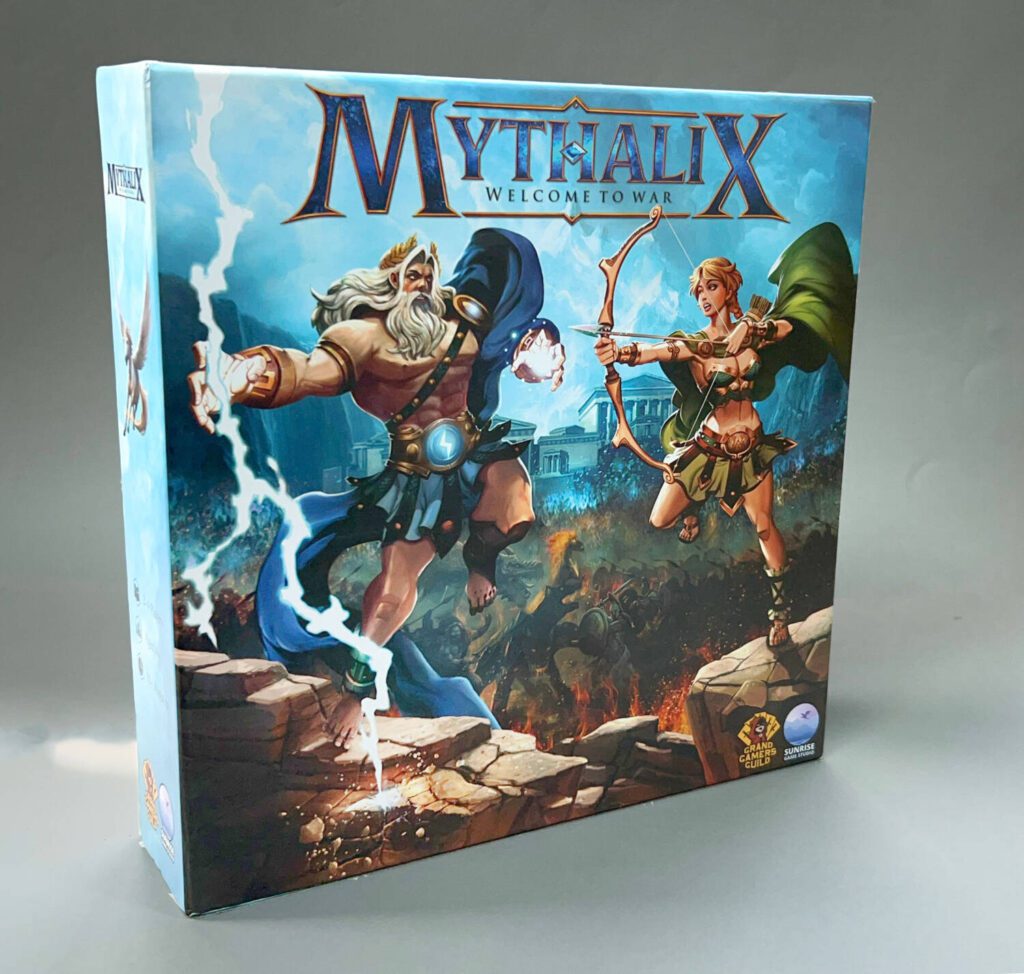
Chaos, the primordial Greek God, has returned to destroy Olympus. However, just before the destruction occurs, a portal opens that allows the Gods to escape—a portal that transports them to a hostile new world, rich with power. By taming that power and collecting four of the planet’s essential Elements, one God can reign supreme!
At least, that’s the story the rule book provides to explain what’s going on in Mythalix. To learn more, let’s get this to the table, shall we?
Preparing the Altars
Give each player a random God card, along with the matching double-sided acrylic avatar, stand, and four clear acrylic hexes, known as Strongholds. Place the God token on one of the four Elemental Altars in the far corners of the board. Then take the matching elemental token for that Altar.
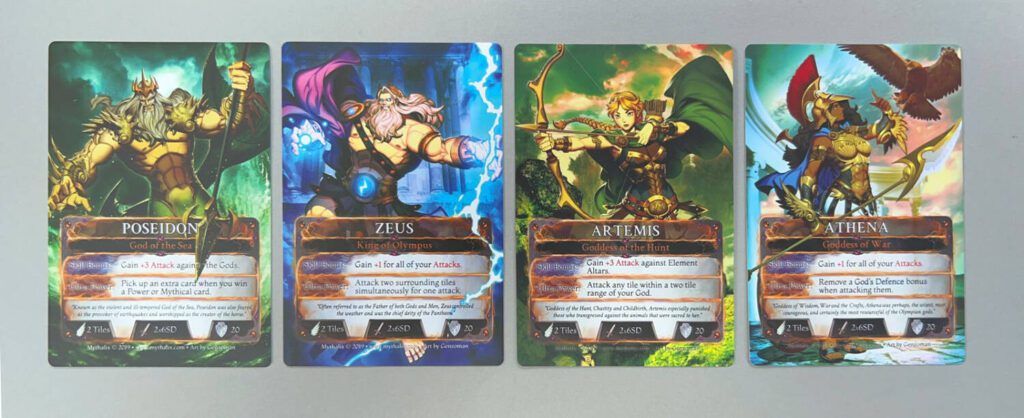
Give each player a player board. Their God card goes in the labeled slot, while the four spaces to the right remain empty (for now). Hand everyone four gold coins apiece, as well as three colored wooden cubes. They’ll place the cubes on the leftmost square of the three trackers (Speed, Defence, and Attack) at the bottom of their player board.
Shuffle the four decks of cards: Army, Warrior, Power, and Mythical. Set them to the side of the board.
Making the Necessary Sacrifices
On a turn, you’ll do the following:
- Collect any coins and/or cards from mines you control
- Spend your coins to buy a card
- Move your God and attack a hex or another God
- Play a card from your hand
You will spend most of the game moving your God and attacking, so I’ll cover that first. Your God is going to start off with a Speed of two, so you can move up to two hexes per turn. If the hex you land on has a graphic on it, you can Attack. The number shown at the top of the hex is the number you have to beat on a roll of the dice to defeat the hex—with your roll modified by any Attack bonuses you may have from cards you’ve gained.
You start the game by rolling two six-sided dice. Lose the roll and nothing bad happens. Win the roll and you’ll claim a gold coin for winning and then one of whatever the icon on the hex represents.
However, if the hex has a thick border around it, you can place one of your four Strongholds on top of the hex. Such hexes with a Movement, Attack, or Defense icon means you’ll slide the matching cube on your player board to the right that number of spaces. If there’s a pickaxe (e.g., a gold coin) or card icon on the hex, it means you’ll get that benefit at the start of your turns until someone attacks and defeats your Stronghold.
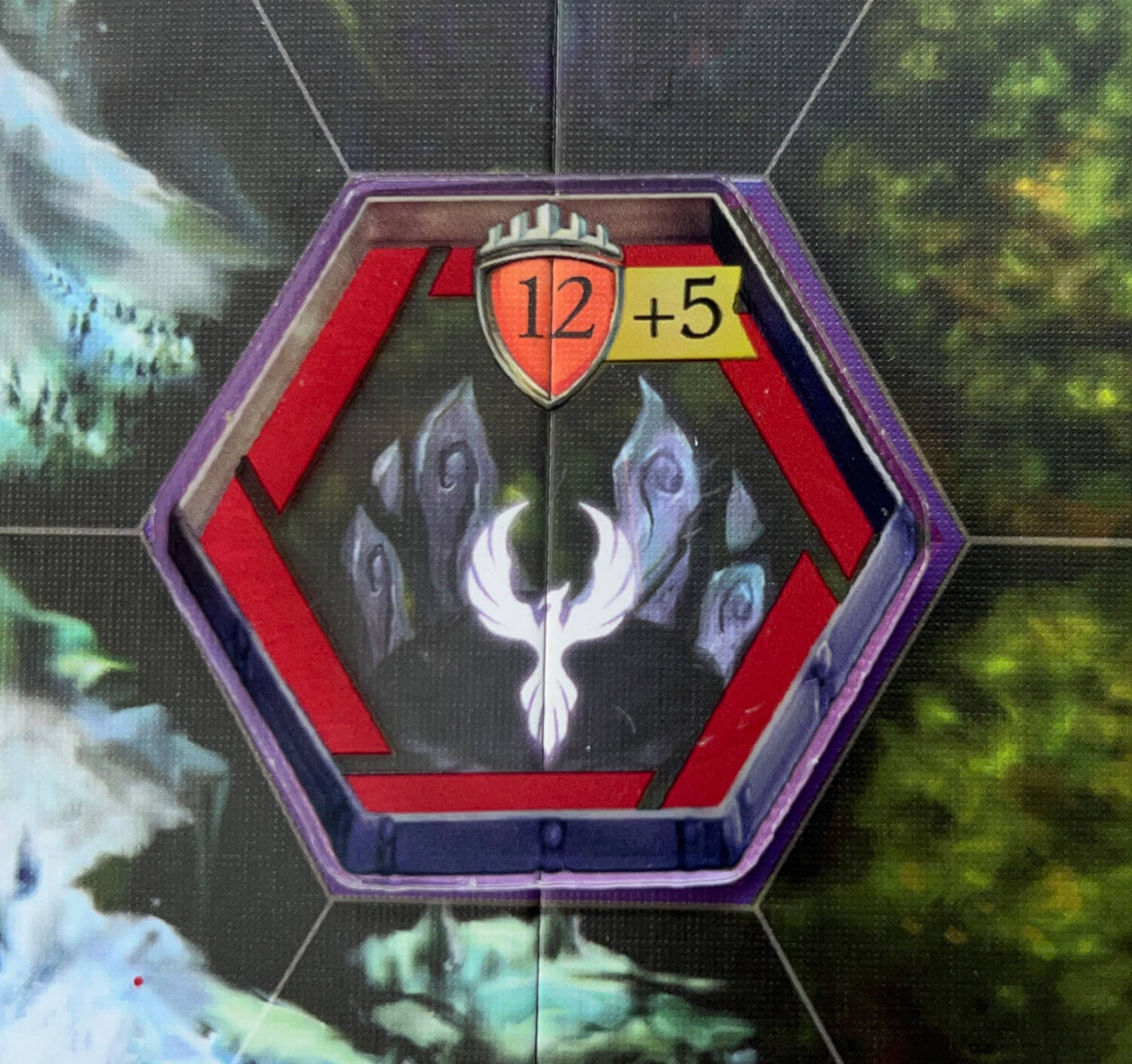
You’ll need to collect coins to purchase cards to bolster your attack stats. Army cards generally give a minor boost to your Attack, while Warrior cards will increase the number of sides to the dice you roll (from six to eight, twelve, or twenty). These get placed on the open slots on your player board. Power cards will grant you special one time powers, while Mythical cards grant you even better one-time powers. You’ll keep these face-down until you wish to use them.
When Attacking a hex or another God, you can play up to three Power and/or Mythical cards from your hand to add to your attack. When Defending an Attack from another God, you can play up to three cards to aid in your defense.
You’ll continue to do this until one player defeats a combination of Elemental Altars and/or other Gods to collect four Elements. To make the game more difficult, players can choose to change that rule to require four different Elements.
Oracles and Divination
Starting with the positives, let me praise the acrylic standees. The Gods in Mythalix are portrayed on a two-sided acrylic piece that fits into an opaque acrylic stand.
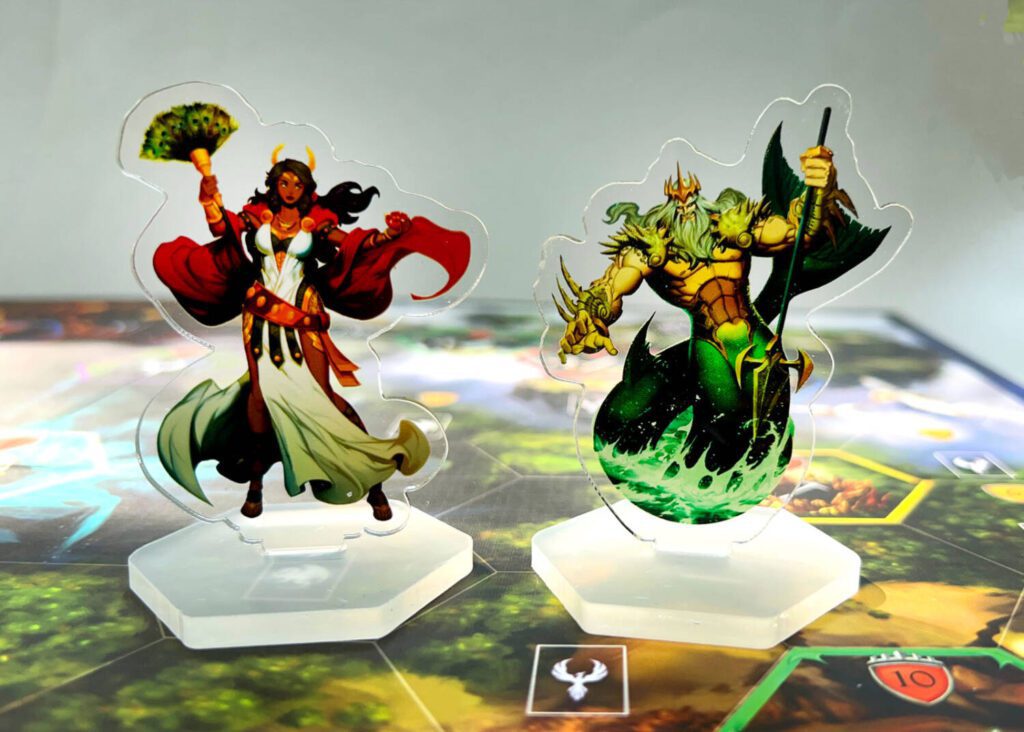
This gives the Gods good board presence—you’re never uncertain where your opponents are. The stands allow you to see (somewhat) the icon on the hex a God is on. (Although we still moved them off to the side for a better view.)
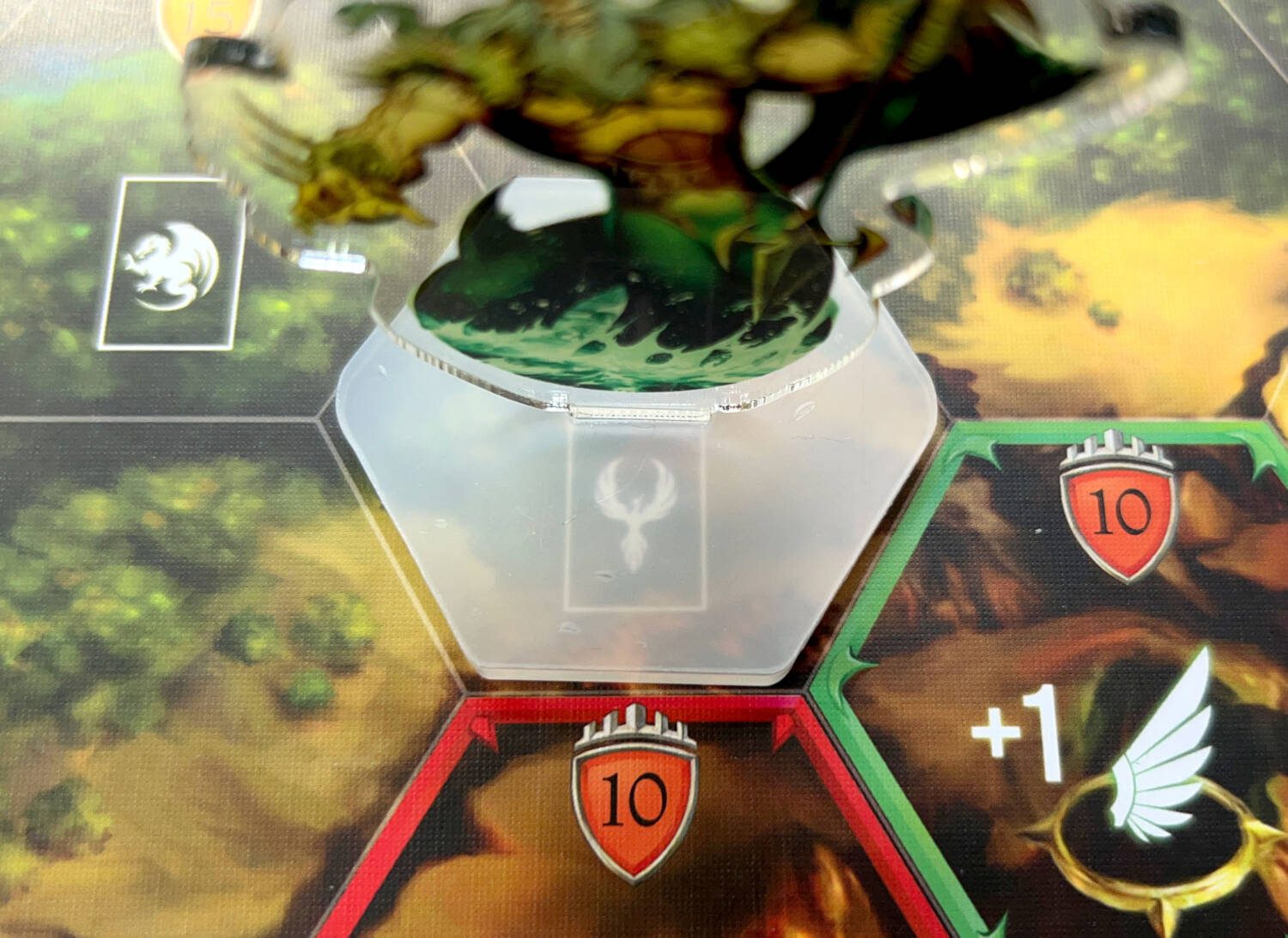
There’s a good mechanic in the Elements required for winning: there are only eight of them in the game. Across two players, that’s not a challenge, but across four players, it is. At four players, you must battle against other Gods to steal away an Element. This requires you to boost your attack, defense, and dice as quickly as possible.
You might want to sit down for the negatives.
I’m sure the initial artwork for the common playing board looked great. However, once you add all the hexes, icons, and borders for Strongholds, the board becomes an over-saturated, chaotic mess. This was not an inviting board.
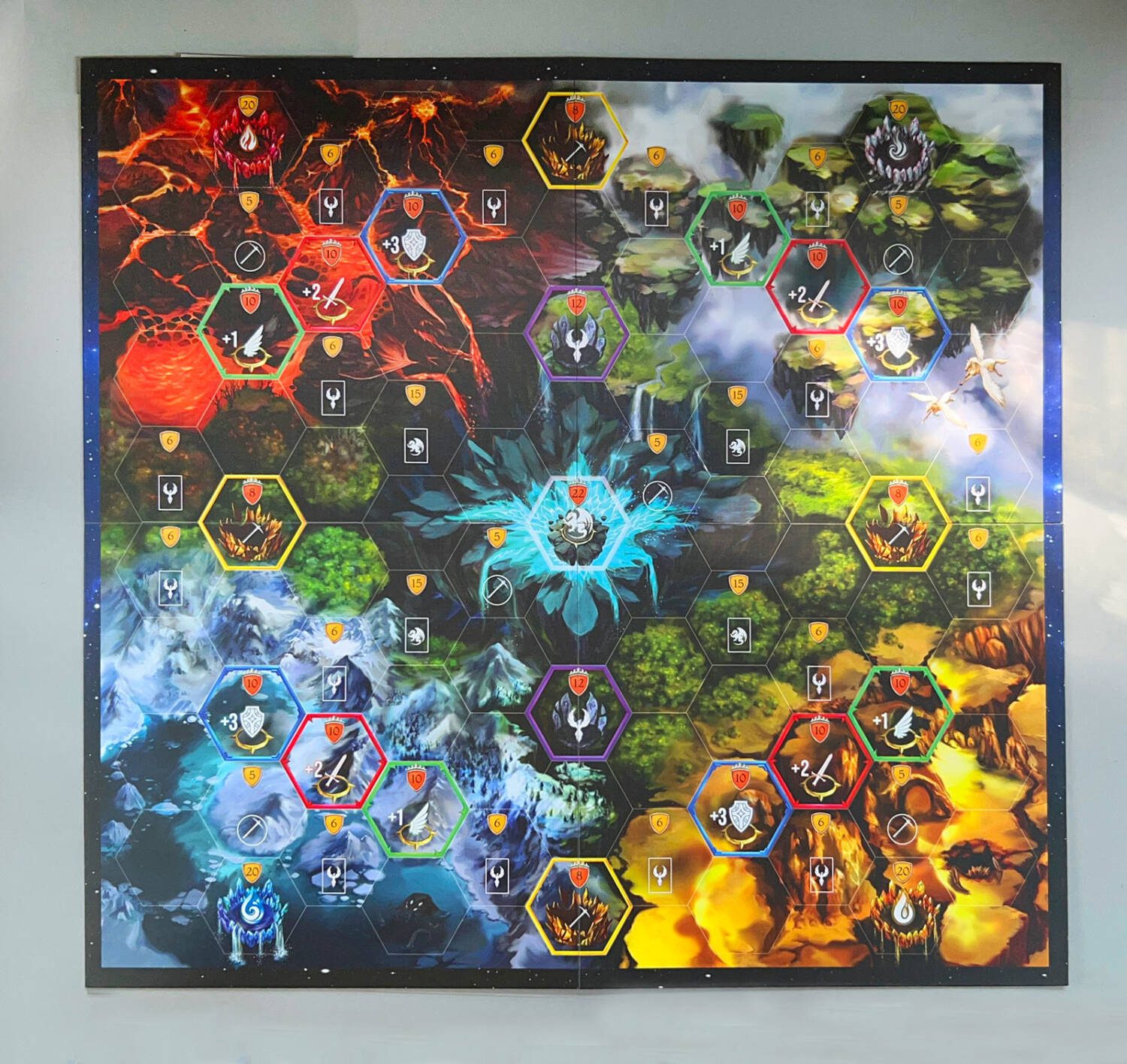
Adding to the mess are the dice. Mythalix comes with two sets of six, eight, twelve, and twenty-sided dice. I think they’re meant to look like blood-soaked dice. Instead, as one of my gaming group pointed out, they look like LifeSavers Strawberry Creme Savers. The gold-colored numbers were so difficult to read across the board they only lasted two rolls before being replaced by other dice from a Dungeons and Dragons set.
Attacking a hex or another God is a simple matter of the Attacker and Defender playing cards to boost their Attack/Defense, then the Attacker rolls two dice. Beat the Defense number and you’ve won. Don’t beat the Defense and all’s forgiven. This does not make for an exciting conflict.
In my first game, I built a Stronghold on a hex that gave me a Power card at the start of each turn. They turned out to be disappointingly not so powerful, offering minor onetime abilities. (Steal a coin from every player; steal an Army card from another player, etc.). The Mythical cards were better, but only when saved up to be played in combination with other cards. Instead of being worthy of their names, the Power and Mythic cards were merely ho-hum cards.
Speaking of the cards, they do not shuffle or deal out well. They stick together. The gold coins are simple yellow plastic disks, devoid of character, as if they were an afterthought.
I had hopes that the attention paid to the acrylic Gods and their stands would pervade the rest of the game. Not only did that attention not carry through, neither did the theme. Yes, many of the cards referenced Greek Gods, but you could have easily stripped this game of all Greek God references and the game wouldn’t be all that different. Greek Mythology is rife with interesting characters, conflicts, and rivalry, none of which appear in Mythalix.
My biggest complaint with Mythalix? It just wasn’t fun. Turns each felt the same: move, roll some dice, who cares? Since the arc of the game will be the same every time you play it, the only things that will change are the cards you draw and the numbers on the dice you roll. Yawn.
As this suggests, Mythalix depends heavily on luck. In fact, you’d better be lucky in your dice rolls or you’ll be out of contention early on. We saw this in a game where one of my group had a string of bad early dice rolls. That left him on the sidelines, struggling, and left behind. He knew he didn’t have a chance of winning, which is definitely not what you want in a game.
I recommend you give Mythalix a Mythamiss.


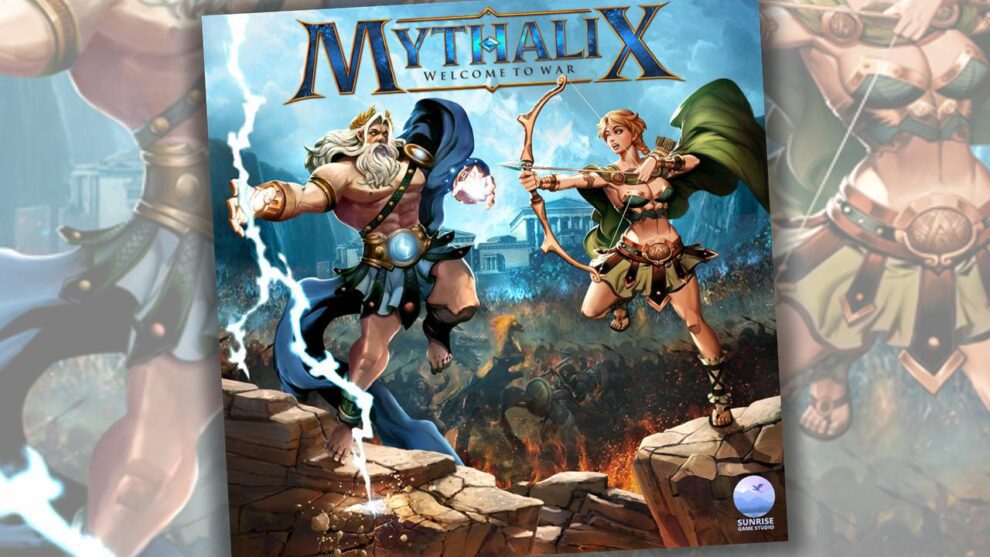



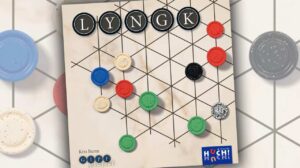

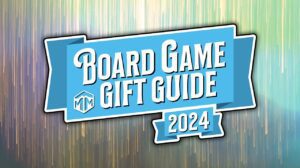


Add Comment